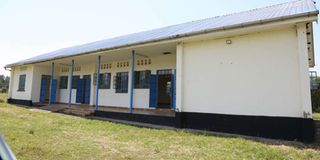Support privately run shelters that give a safe haven to SGBV survivors

Tieng’re Rescue Center in Kisumu.
What you need to know:
- It is obvious that the best way to save a victim of SGBV is to remove them from the dangerous fangs and chokehold of the perpetrator to safety.
- To its credit, Makueni County government is the only devolved unit so far to establish an alternative and safe accommodation to shelter SGBC survivors.
- During the Covid-19 offensive, the privately run shelters have played a major and critical role in offering life-saving services.
One of the most-pronounced appeals and recommendations that women rights organisations, in particular, have consistently made since the ‘shadow pandemic of sexual and gender-based violence (SGBV) emerged earlier this year are calls to have women and girls — survivors and those at risk of the violence and violations — protected through access to alternative and safe shelter and temporary accommodation.
The lobbying and the appeals have mainly been directed at both levels of government, when it emerged that perpetrators of SGBV (including violations against children, mainly girls) continue to take advantage of the containment measures against the Covid-19 pandemic to unleash this criminality against their vulnerable targets even in the families.
The organisations have been unanimous in asking that the national and county governments provide shelters at this time when the abuse and violence is at an all-time high and after Covid-19 is wiped out (if it ever will). It is obvious that the best way to save a victim of SGBV is to remove them from the dangerous fangs and chokehold of the perpetrator to safety, where they can be provided with help and care as they strive to heal.
Mounted a campaign
At the time of writing this article, there was no concrete action or clear indication that both levels of government had factored in or given priority to the disparate distinct effects of the horrifying coronavirus on women and girls, especially in allocation of resources and budgeting for the same. To its credit, Makueni County government is the only devolved unit so far to establish an alternative and safe accommodation to shelter SGBC survivors.
The Coalition on Violence Against Women (Covaw) has mounted a campaign — Wape Kimbilio — through which they are lobbying the national government and all the 47 county administrations to provide shelters for SGBV survivors. Importantly, Covaw is tying it with an awareness on how Protection Orders (Restraining Orders) work to keep SGBV perpetrators away from their victims or targets.
Besides, there are also individuals and a handful of organisations that endeavour to support girls and women who are SGBV survivors. During the Covid-19 offensive, the privately run shelters have played a major and critical role in offering life-saving services to this group of vulnerable Kenyans. Most important are the much-needed shelters and safe alternative accommodation and also emotional, physical and socioeconomic help.
The private shelter operators deserve national accolades for their work but continue to do their bit quietly, without seeking praise or recognition. The least the government can do is to help to strengthen these shelters, which are operational in some counties, as it works towards establishing its own.
Forming a partnership
And these shelters have come up with a noble idea of forming a partnership. The National Shelters Network (NSN) comprises 39 of them from across 14 counties as mapping continues to widen the involvement.
The network’s stated objective is to ensure that as many women and girls who are survivors of SGBV fully access help. The NSN has partnered with the Collaborative Centre for Gender and Development in the initiative.
Let the government lend them support, including facilitating registration, as well as in collaboration. That these shelters bear the huge burden of working with SGBV survivors with high expectations of provision of services after the abuse and violation — which include interim care, rehabilitation, the long-term support required for them to heal and get reintegrated into the society — it clearly demands the need for State support.
The fact that the State Department of Gender appears to embrace the initiative is a good indicator of willingness by the government to not only lend support to the already established shelters but also establish new ones, starting with counties that have none. That will be huge stride in the fight against SGBV. It is the right thing to do.
Ms Rugene is consulting editor and founder, The Woman’s Newsroom Foundation. [email protected].





